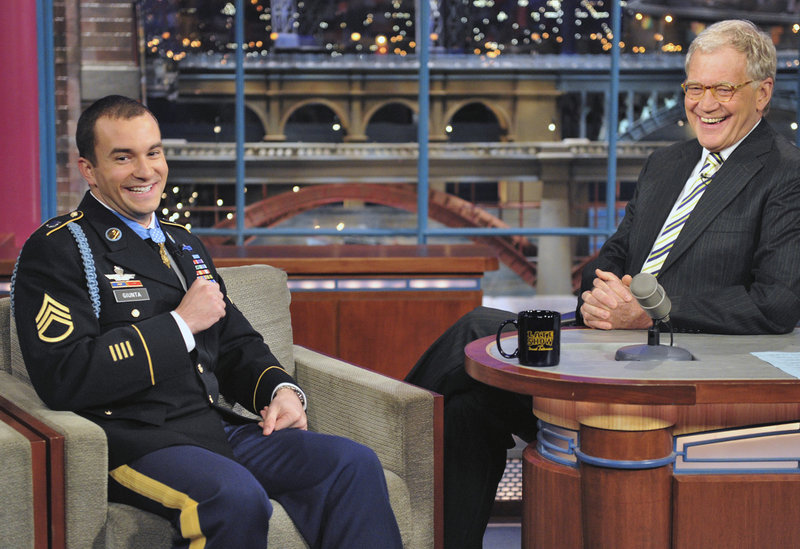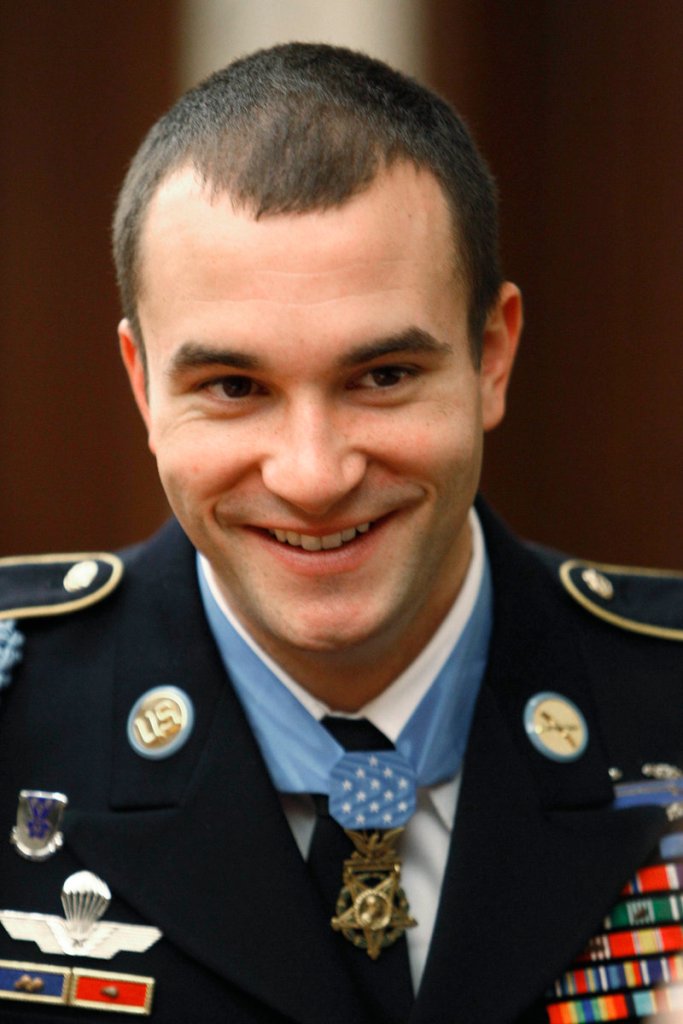CHICAGO – It was years in the making, so Staff Sgt. Sal Giunta had time to talk with his wife about the “what if” question. He’d been recommended for the Medal of Honor, the nation’s highest military decoration. If chosen, his name would be in headlines. He’d be a celebrity.
And again and again, he’d have to tell strangers the harrowing story of a deadly ambush in Afghanistan.
“He was worried,” said Giunta’s wife, Jenny. “He didn’t know how he was going to talk to people about it. He couldn’t even talk to me. He didn’t even talk to his parents about it. How was he going to talk to the world about it? How was he going to be OK with telling his story?”
Giunta did receive the medal. And, as expected, he’s become a celebrity, with a celebration at the White House. Praise from the president. Late-night TV appearances. And calls, too, for him to tell his story — a story that forever changed his life.
Through it all, Sal Giunta has remained a humble man in a “look at me” world, quickly adjusting to his newfound fame, insisting he’s just an average soldier. The gold, five-point star draped around his neck says otherwise: He’s the first living recipient of the Medal of Honor for service in Afghanistan and Iraq — and the first for actions since Vietnam.
The 25-year-old soldier would have you believe there’s nothing special about braving rocket-propelled grenades, machine guns and a wall of bullets to help one comrade, then free another from the clutches of the Taliban.
“I’m not a very smart guy,” he recently told a crowd, many of them veterans, gathered to see him at an armory outside of Chicago. “I haven’t guided myself to the position I’m in. I’ve been mentored. I’ve been tutored. I’ve been taught along the way. I’ve been told to follow. I’ve been told to lead.”
Giunta casts himself as an ambassador for everyone in uniform. Modestly, of course: “I’m representing so many people that I know for a fact are faster than me, smarter than me, stronger than me, braver than I am,” he said.
He knows, though, he’s the star attraction, the reason crowds come out on a bitter winter morning. It’s his story that people still want to hear — and telling it doesn’t get any easier.
“I’ve never seen anyone else asked what was the worst day in your life and let’s break it down piece by piece and please go into detail,” he said. “For some reason they continually ask me every single day and multiple times a day. Of course, it’s difficult. I lost two very good friends that day. They mean absolutely everything (to me) and people brush by their names. And they keep saying ‘Giunta. Staff Sgt. Giunta.’ That doesn’t feel right.”
The dead were Sgt. Josh Brennan and Spc. Hugo Mendoza. Both were on the mission with Giunta as part of Company B, 2nd Battalion (Airborne), 503rd Infantry Regiment.
Giunta was tight with Brennan; they trained together and traveled around Italy, where they were based. “He was athletic, smart, funny, always someone you could count on,” he said. As for Mendoza, a medic: “He truly cared about other people more than he did about himself.” And, as a bonus: “He knew the best jokes.”
It was a moonlit night on Oct. 25, 2007, when enemy forces formed an L-shaped ambush around Giunta’s platoon in the Korengal Valley in eastern Afghanistan, a dangerous strip of land that served as a key route for al-Qaida to move weapons, fighters and money from Pakistan.
Brennan and another soldier were hit first. When Staff Sgt. Erick Gallardo ran through an open area to link up with them, he was stopped by a barrage of gunfire. Moving toward Giunta, he was struck, a round from an AK-47 dinging off his helmet and temporarily disorienting him.
Giunta jumped up, exposing himself to rockets and enemy fire, to help Gallardo. One bullet then smashed into Giunta’s armor — pushing him back. Another shattered the weapon slung across his back.
Giunta and his comrades regrouped, throwing grenades and charging forward. When Giunta, who was a rifle team leader, realized Brennan was missing, he raced ahead and saw two insurgents carrying the wounded sergeant by his arms and legs.
Giunta, alone and without cover, shot and killed one of the insurgents; the other ran away. Giunta dragged Brennan by the vest to safety. He tried to stop the bleeding, tried to comfort his friend. Someday, Giunta told the mortally wounded soldier, he’d be telling hero stories.
Why did Giunta do it? He said it was the logical next step, but in a recent Army interview, Gallardo said Giunta simply wanted to save his buddy. Brennan “would have done the same thing for me,” he quoted Giunta as saying.
Gallardo said he told Giunta: “You don’t understand … but what you did was pretty crazy. We were outnumbered. You stopped the fight. You stopped them from taking a soldier.”
“Unbelievable what he did that night,” Gallardo said. “I know he’s going to hate me for saying this, but he’s the face of the war now.”
Giunta, though, refuses to take credit for any extraordinary feats. “I did my job and I did it to the best of my ability,” he said in an interview. “I did whatever everyone else did.”
Giunta wanted to make sure all the guys he served with received “enough respect,” Jenny Giunta said, but understood, too, that he could seize this once-in-a-lifetime moment to talk about something bigger — the sacrifices of U.S. troops and their families.
So in every appearance, he pivots from the Sal Giunta story to the bigger picture.
Americans “can live their lives unhampered by these wars because there are people who will raise their right hand and say, ‘I will go to war for my country,”‘ he said. “They’re so fortunate and they don’t even know it.”
Salvatore Augustine Giunta didn’t plan on becoming a soldier. He was a rambunctious kid who liked to fool around and play golf. He got in his share of trouble as a teenager and tended to wing it in school.
Giunta was still in high school mopping floors one night at his job at a Subway sandwich shop when he heard a recruitment commercial on radio. The lure: A free T-shirt. The catch: He had to listen to the pitch.
Giunta liked what he heard: He could get paid to jump out of planes, learn to shoot, run around in the woods, make friends, see the world and serve his country.
He got his T-shirt. And a plan for the next four years.
Giunta says he grew up during his first deployment to Afghanistan. Over one two-week period, his company lost five members. “I saw every single one of those people within two hours before and I saw them after they died.”
It changed his outlook on his life.
“At 18 years old, you think you can go out and conquer the world,” he said. “You’ve just trained for a year. You jump out of planes. You can shoot the targets you’re aiming at. You’re going to go there, you’re going to kick butt, you’re going to come back. Everything’s going to be OK and we’re going to move on. But in those two weeks, it just became apparent to me that’s not how it goes.”
Giunta’s hitch ends in February; he says he hasn’t decided whether he’ll stay in the Army, but acknowledges he’s been flooded with offers in and out of the military.
His mother says she’s reminded her son he need not accept all the offers and invitations.
“I said, ‘Sal, there are so many doors opening for you,”‘ she recalled, “‘but you don’t have to walk through every one.’ “
Send questions/comments to the editors.




Comments are no longer available on this story